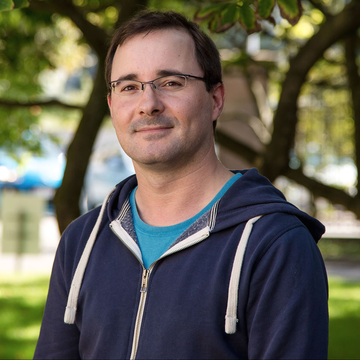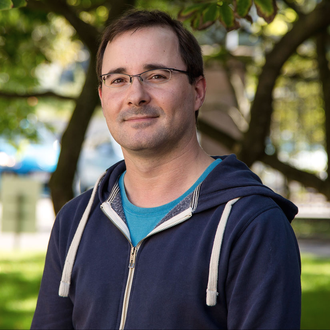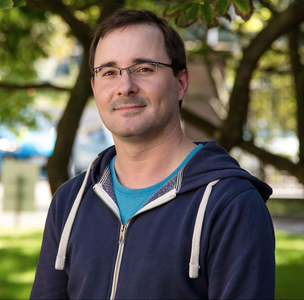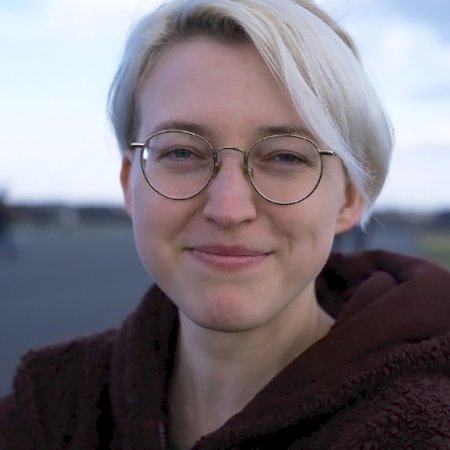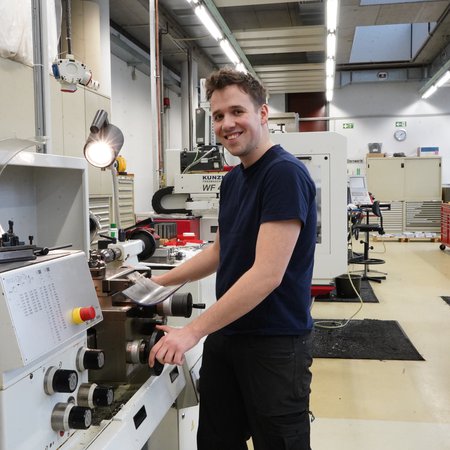Wempe award for Oliver Gressel
In recognition of his outstanding research on the galactic dynamo and the evolution of planets in protoplanetary disks, Prof. Dr. Oliver Gressel from the Niels Bohr International Academy Copenhagen, Denmark is awarded the Wempe Award. The ceremony will take place on 16th October 2015, starting at 10 a.m. at the Leibniz Institute for Astrophysics Potsdam (AIP).
Magnetic fields and turbulence are the main fields of interest of Prof. Dr. Oliver Gressel. By using computer simulations Gressel analyzes the evolution of turbulences within magnetic fields. He also focuses on the evolution of galactic magnetic fields and the formation of planets in gaseous and dust disks around young stars. After his PHD at AIP and the University of Potsdam, Gressel went to London and Stockholm to study the evolution of planets and the galactic dynamo. Sincs 2013 he works as Assistant Professor at the Niels Bohr International Academy Copenhagen. Just recently he succeeded in raising financial means from the European Research Council (ERC).
Schedule
10:00 a.m.
- Opening by Prof. Dr. Matthias Steinmetz, AIP
- Welcome by Carsten Feller, MWFK Brandenburg
- Laudatio by Prof. Dr. Klaus Strassmeier, AIP
- Award ceremony
11:15 a.m.
- Special talk by Prof. Dr. Wilhelm Kley, Eberhard Karls Universität Tübingen: "Disks in binary star systems“
About the Wempe Award
In honour of Prof. Dr. Johann Wempe (1906 - 1980), the last director of the former Astrophysical Observatory of Potsdam, the AIP annually grants the Johann Wempe award, first awarded in 2000, to an outstanding scientist. The award is financed from funds left in the will of Johann Wempe. It consists of a stipend of €2,500 per month to facilitate a research visit to the AIP of up to six months. The recipient may be either a promising young scientist who has already made notable achievements or a senior scientist, in recognition of his or her life's work. The recipient is expected to enrich the scientific life of the institute through a series of lectures in their area of expertise.
In recognition of his outstanding research on the galactic dynamo and the evolution of planets in protoplanetary disks, Prof. Dr. Oliver Gressel from the Niels Bohr International Academy Copenhagen, Denmark is awarded the Wempe Award. The ceremony will take place on 16th October 2015, starting at 10 a.m. at the Leibniz Institute for Astrophysics Potsdam (AIP).
Magnetic fields and turbulence are the main fields of interest of Prof. Dr. Oliver Gressel. By using computer simulations Gressel analyzes the evolution of turbulences within magnetic fields. He also focuses on the evolution of galactic magnetic fields and the formation of planets in gaseous and dust disks around young stars. After his PHD at AIP and the University of Potsdam, Gressel went to London and Stockholm to study the evolution of planets and the galactic dynamo. Sincs 2013 he works as Assistant Professor at the Niels Bohr International Academy Copenhagen. Just recently he succeeded in raising financial means from the European Research Council (ERC).
Schedule
10:00 a.m.
- Opening by Prof. Dr. Matthias Steinmetz, AIP
- Welcome by Carsten Feller, MWFK Brandenburg
- Laudatio by Prof. Dr. Klaus Strassmeier, AIP
- Award ceremony
11:15 a.m.
- Special talk by Prof. Dr. Wilhelm Kley, Eberhard Karls Universität Tübingen: "Disks in binary star systems“
About the Wempe Award
In honour of Prof. Dr. Johann Wempe (1906 - 1980), the last director of the former Astrophysical Observatory of Potsdam, the AIP annually grants the Johann Wempe award, first awarded in 2000, to an outstanding scientist. The award is financed from funds left in the will of Johann Wempe. It consists of a stipend of €2,500 per month to facilitate a research visit to the AIP of up to six months. The recipient may be either a promising young scientist who has already made notable achievements or a senior scientist, in recognition of his or her life's work. The recipient is expected to enrich the scientific life of the institute through a series of lectures in their area of expertise.
Images
Prof. Dr. Oliver Gressel.
